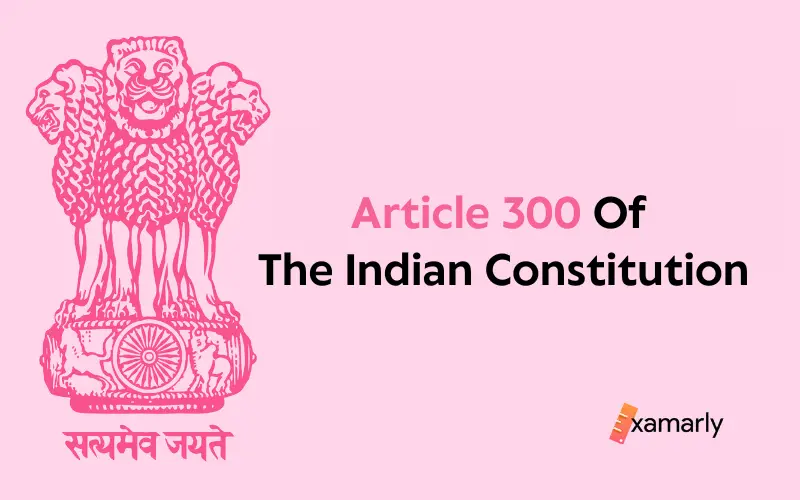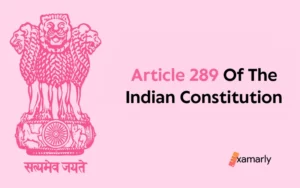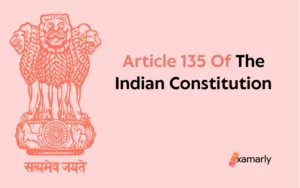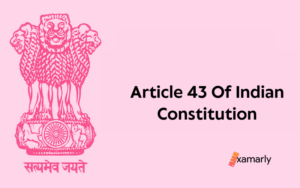Article 300 of the Indian Constitution pertains to suits and proceedings by or against the Government of India or a state government.
It states that the Government of India or a state government may sue or be sued in the name of the Union of India or the state, depending on the circumstances, and that any legal proceeding against the Government of India or a state government may be instituted in any court of law within the territory of India.
In addition, it states that any legal proceeding against the Government of India or a state government may be instituted in any court of law within the territory of India.
Article 300 of the Indian constitution stipulates that no act or proceeding of the Government of India or a state government shall be called in question in any court on the ground that it is not an act or proceeding of the Government of India or the state government, as the case may be, unless the contrary is proved.
The burden of evidence is on the party contesting the legitimacy or authority of a government action or procedure, and the government’s acts or proceedings are typically believed to be lawful and authorized.
Let us dig deep into Article 300 of the Indian Constitution and ensure that we have the best of all the concepts.
Article 300 Of The Indian Constitution – In Detail
We will break down each and every clause present in Article 300 of the Indian Constitution just so as to have a better understanding of them.
Clause 1 – As it is & Explained
300. Suits and proceedings
(1) The Governor of India may sue or be sued by the name of the Union and the Government of a State may sue or be sued by the name of the State and may, subject to any provisions which may be made by Act of Parliament or of the Legislature of such State enacted by virtue of powers conferred by this Constitution, sue or be sued in relation to their respective affairs in the like cases as the Dominion of India and the corresponding Provinces or the corresponding Indian States might have sued or been sued if this Constitution had not been enacted
The first clause of Article 300 of the Indian Constitution says that subject to any provisions which may be made by Act of Parliament or of the Legislature of such State enacted in virtue of powers conferred by this Constitution, the Governor of India may sue or be sued in the name of the Union,
The Government of a State may sue or be sued in the name of the State, in the same cases as the Dominion of India and the corresponding Provinces or the corresponding Indian States.
Clause 2 – As it is & Explained
(2) If at the commencement of this Constitution
(a) any legal proceedings are pending to which the Dominion of India is a party, the Union of India shall be deemed to be substituted for the Dominion in those proceedings; and
(b) any legal proceedings are pending to which a Province or an Indian State is a party, the corresponding State shall be deemed to be substituted for the Province or the Indian State in those proceedings CHAPTER IV RIGHT TO PROPERTY
The second clause of Article 299 of the Indian Constitution put down the conditions at the starting of Constitution in the context.
The conditions are mentioned in the sub-clauses (a) and (b), it says that at the beginning of the Constitution
(a) the Dominion of India is a party to any ongoing legal proceedings, in which case the Union of India shall be regarded to be substituted for the Dominion; and
(b) if a province or an Indian state is a party to any current legal proceedings, the corresponding State will be regarded as substituting for the province or the Indian State in such proceedings.
You Might Also Want To Read – Article 298 Of The Indian Constitution
Summing Up
We can conclude from Article 300 of the Indian Constitution that no act or proceeding of the Government of India or a state government shall be called in question in any court on the ground that it is not an act or proceeding of the Government of India or the state government, as the case may be, unless the contrary is proved.
We can also conclude that the government’s actions or proceedings are generally presumed to be valid and authorized, and the burden of proof is on anyone challenging the validity or authority of such actions or proceedings.
FAQs
What is the purpose of Article 300?
Article 300 of the Indian Constitution pertains to suits and proceedings by or against the Government of India or a state government. It establishes the legal process for initiating and resolving disputes involving the government and sets out the rights and obligations of the government in such matters.
Can the Government of India or a state government be sued?
Yes, the Government of India or a state government may be sued by the name of the Union of India or the state, as the case may be.
In which courts can a legal proceeding against the government be instituted?
A legal proceeding against the Government of India or a state government may be instituted in any court of law within the territory of India. However, the government has the right to specify a particular court or authority in which a particular suit or proceeding against it shall be instituted, by issuing a notification in the official gazette.
Is the government’s action or proceeding subject to review by the courts?
No, Article 300 states that no act or proceeding of the Government of India or a state government shall be called into question in any court on the ground that it is not an act or proceeding of the government unless the contrary is proved. This means that the government’s actions or proceedings are generally presumed to be valid and authorized, and the burden of proof is on anyone challenging the validity or authority of such actions or proceedings.






